W alker Percy and the Politics of the Wayfarer
Politics, Literature, and Film
Series Editor: Lee Trepanier, Saginaw Valley State University
The Politics, Literature, & Film series is an interdisciplinary examination of the intersection of politics with literature and/or film. The series is receptive to works that use a variety of methodological approaches, focus on any period from antiquity to the present, and situate their analysis in national, comparative, or global contexts. Politics, Literature, & Film seeks to be truly interdisciplinary by including authors from all the social sciences and humanities, such as political science, sociology, psychology, literature, philosophy, history, religious studies, and law. The series is open to both American and non-American literature and film. By putting forth bold and innovative ideas that appeal to a broad range of interests, the series aims to enrich our conversations about literature, film, and their relationship to politics.
Advisory Board
Richard Avaramenko, University of Wisconsin-Madison
Linda Beail, Point Loma Nazarene University
Claudia Franziska Brhwiler, University of St. Gallen
Timothy Burns, Baylor University
Paul A. Cantor, University of Virginia
Joshua Foa Dienstag, University of California at Los Angeles
Lilly Goren, Carroll University
Natalie Taylor, Skidmore College
Ann Ward, University of Regina
Catherine Heldt Zuckert, University of Notre Dame
Recent Titles
Walker Percy and the Politics of the Wayfarer by Brian A. Smith
Romanticism and Civilization: Love, Marriage and Family in Rousseaus Julie by Mark Kremer
Aldous Huxley: The Political Thought of a Man of Letters by Alessandro Maurini
Sinclair Lewis and American Democracy by Steven Michels
Liberty, Individuality, and Democracy in Jorge Luis Borges by Alejandra M. Salinas
W alker Percy and the Politics of the Wayfarer
Brian A. Smith
LEXINGTON BOOKS
Lanham Boulder New York London
Published by Lexington Books
An imprint of The Rowman & Littlefield Publishing Group, Inc.
4501 Forbes Boulevard, Suite 200, Lanham, Maryland 20706
www.rowman.com
Unit A, Whitacre Mews, 26-34 Stannary Street, London SE11 4AB
Copyright 2017 by Lexington Books
All rights reserved . No part of this book may be reproduced in any form or by any electronic or mechanical means, including information storage and retrieval systems, without written permission from the publisher, except by a reviewer who may quote passages in a review.
Excerpt(s) from LANTERNS ON THE LEVEE by William Alexander Percy, copyright 1941 by Alfred A. Knopf, a division of Penguin Random House LLC, copyright renewed 1969 by LeRoy Pratt Percy. Used by permission of Alfred A. Knopf, an imprint of the Knopf Doubleday Publishing Group, a division of Penguin Random House LLC. All rights reserved.
British Library Cataloguing in Publication Information Available
Library of Congress Cataloging-in-Publication Data
Library of Congress Control Number: 2017944829
ISBN 978-1-4985-3754-4 (cloth : alk. paper)
ISBN 978-1-4985-3755-1 (electronic)
 The paper used in this publication meets the minimum requirements of American National Standard for Information SciencesPermanence of Paper for Printed Library Materials, ANSI/NISO Z39.48-1992.
The paper used in this publication meets the minimum requirements of American National Standard for Information SciencesPermanence of Paper for Printed Library Materials, ANSI/NISO Z39.48-1992.
Printed in the United States of America
Dedicated to Nellie E. Murphy
Contents
I first read Walker Percy on a friends suggestion early in graduate school. I think it was the comic depiction of characters lost and wandering through life that charmed me at first. But Percys explanation of how weve forgotten what it means to be wayfarers and what that means for America drew me in further. Growing up in a suburb of Los Angeles and then moving from Washington, D.C. to New Jersey has a way of sharpening ones sense of how community shapes our lives or doesnt. Many people inspired the ideas behind this book, and more importantly, made being a member of actual communities possible.
Matthew Sitman and Peter Lawler were the first people to encourage me to pursue writing about Percy, and without them, this book never would have come into being. Similarly, I discussed the book as it developed over the years several times with Elizabeth Amato, and our conversations helped me clarify the direction of the project.
I received crucial early support in the form of a summer research grant from the H.B. Earhart Foundation in 2010. This freed me from teaching for a summer to reread all of Percys work, and allowed me to conceive of this project as something more than a set of interrelated articles.
Although none of them teach Percy, Ive been blessed with many different mentors that have shaped my thinking in more ways than I can count. Brendan, Robert, and Stephanie Purdy introduced me to ideas and what an intellectual life could be. A long list of other teachers invited me into conversations in and out of class: Patrick Geary, Dan ONeill, and Kirstie McClure at UCLA and Richard Boyd, Patrick Deneen, Bruce Douglass, Josh Mitchell, and Elizabeth Stanley at Georgetown deserve special mention.
As this book slowly progressed, many others read and commented on the drafts. Early on, Aimee Barbeau and Elizabeth Mercurio commented on an essay that became part of chapter 1 . Three of my students at Montclair State UniversityKate Goldner, Jonathan Maiorano, and Candice Maneripatiently read and critiqued the individual chapters as I drafted them. They also endured countless hours of anecdotes and analogies from his work. My friend Terry McCord edited the whole manuscript, catching dozens of mistakes and lapses in clarity.
I presented chapters from the book many times, and wish to thank audiences at Berry College, Loyola University of New Orleans, Calvin College, the Conference on Faith and History, and the American, New England, Northeastern, and Southern Political Science Associations. I met Rhoda Faust at Loyola when she worked at the Walker Percy Center, and I am very grateful for the use of one of her photographs of Percy on the cover. In additional to the travel funding for these presentations, I also wish to express thanks to Montclair State University that awarded me a sabbatical leave in Fall 2015, during which time I completed the draft manuscript.
At Lexington Books, Joseph Parry showed enthusiastic interest in the project at a very early stage, and was still excited when I finally submitted a proposal. Emily Roderick ably guided me through the submission and permissions process and ensured things went smoothly. I also want to thank the anonymous peer reviewer for his or her comments, which helped clarify and smooth out the rough edges of the book.
My family has provided a place of rest and different kind of inspiration throughout this project. My children Eleanor, Abigail, and Lincoln were all born as I wrote this book, and they gave me reasons to smile every day and press on. Greg Smith, Linda Smith, Kelly Smith, Allen Morgan, Laura Morgan, and Joshua Morgan have supported my work both morally and materially.
My wife Sarah inspired me to keep going when I thought of moving on, patiently listened to all my ideas about Percy, and read the final draft with careall while finishing her dissertation. She makes our home a place of rest.
This book is dedicated to my grandmother, Nellie Murphy, who taught me how to read.
The Moviegoer
Copyright 1961 by Walker Percy
Copyright renewed 1989 by Walker Percy
Reprinted with permission of MacIntosh & Otis, Inc.
The Last Gentlemen
Copyright 1966 by Walker Percy
Copyright renewed 1994 by Mary Bernice Percy, Mary Pratt Lobdell, and Ann Moores
Next page
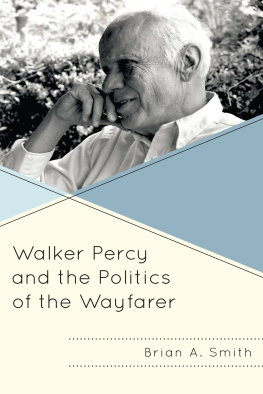
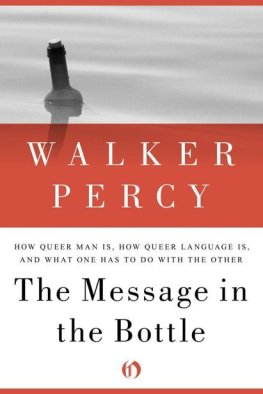
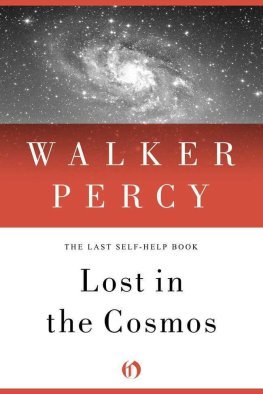
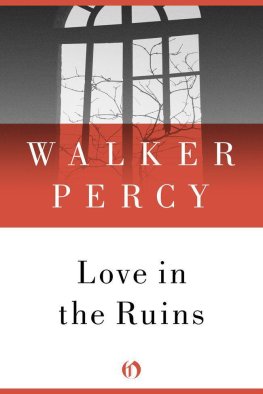
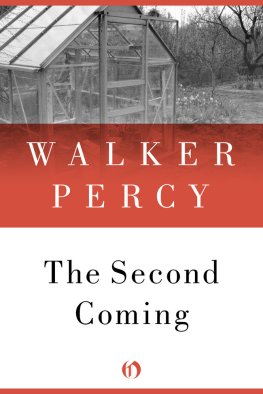
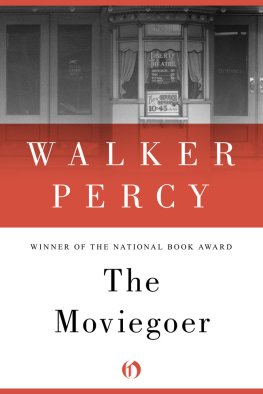
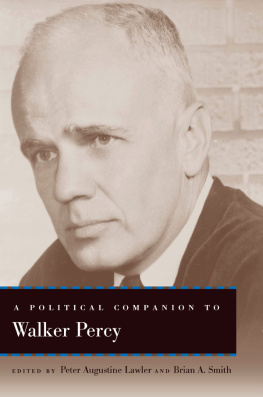
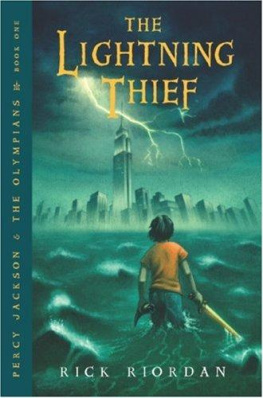
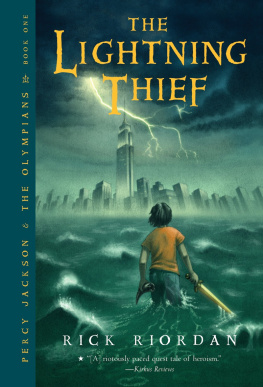
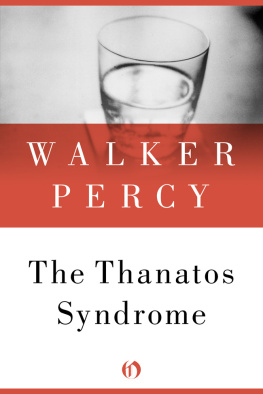
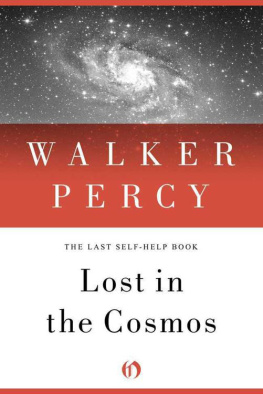

 The paper used in this publication meets the minimum requirements of American National Standard for Information SciencesPermanence of Paper for Printed Library Materials, ANSI/NISO Z39.48-1992.
The paper used in this publication meets the minimum requirements of American National Standard for Information SciencesPermanence of Paper for Printed Library Materials, ANSI/NISO Z39.48-1992.